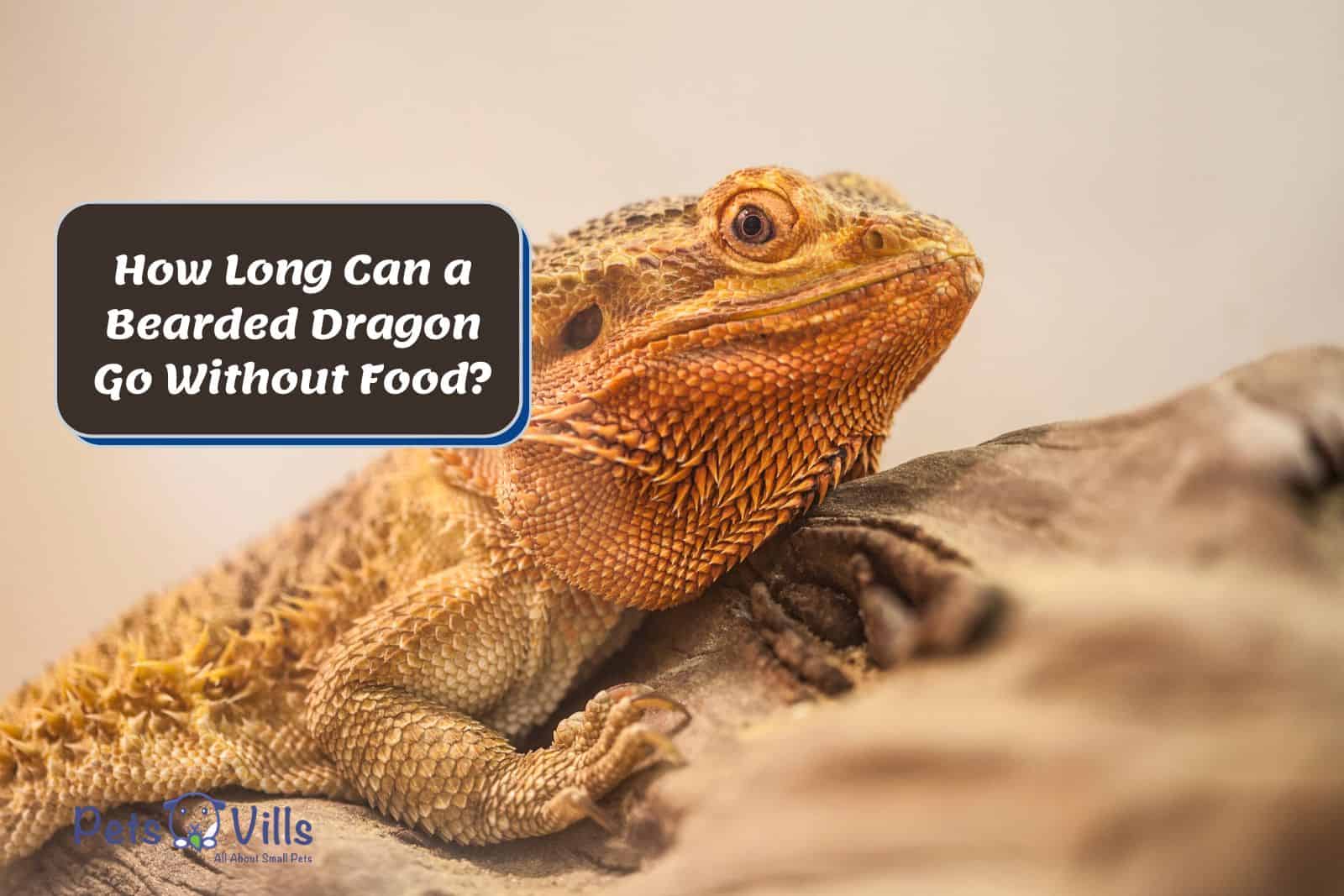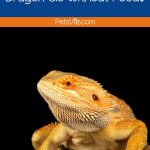How long can a bearded dragon go without food? It’s a topic many owners ask themselves when going on extended trips or vacations.
So I found it necessary to dive deeply into a bearded dragon’s no-food tolerance.
Let’s see whether having a friend or family member feed them is necessary.
Table of Contents
Quick Summary
- Adult bearded dragons can go up to 2 months without a food source. It’s a developed trait from living in the barren deserts of their native Australia.
- Baby bearded dragons won’t last as long as adults without food. They only survive a couple of days without a food source.
- Juvenile beardies can last a little longer than babies. It’s not out of the question for them to survive a few weeks.
- Beardies who stop eating could be doing it for several reasons. It could be their natural brumation period, a dietary issue, an illness, or even stress.
- Owners need to contact their vets anytime their beardies stop eating. It’s best to get a handle on it before this issue gets out of control.
How Long Can Your Beardie Survive Without Eating Food?
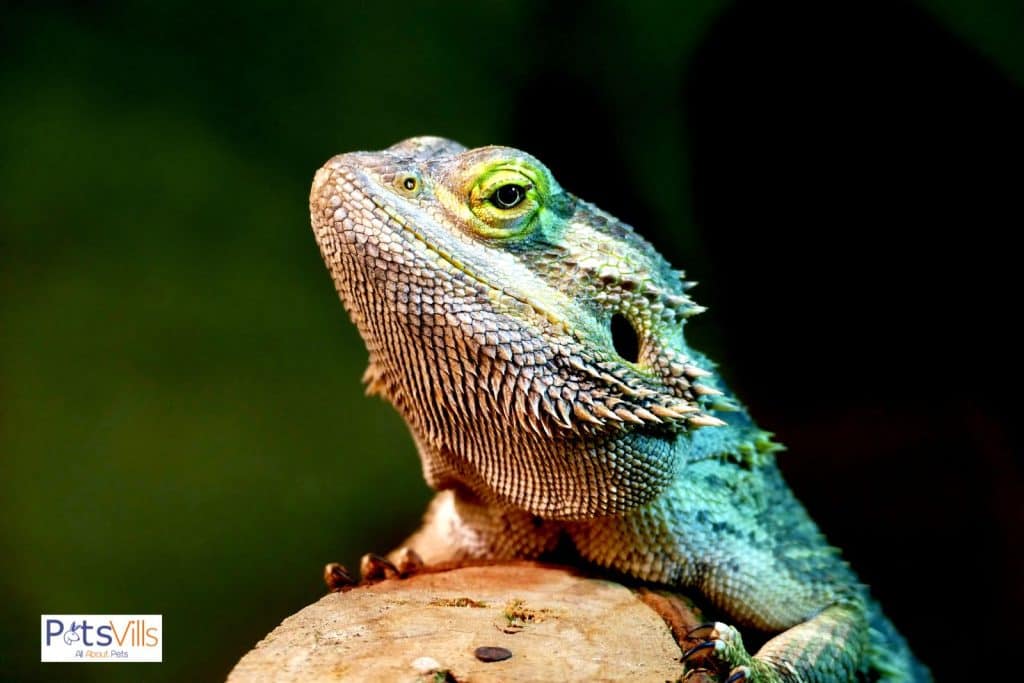
Beardies have a much longer tolerance for no food than humans. For instance, adult bearded dragons can survive up to 2 months without food.
It comes from beardies having fat stored and weight to lose. I’m sure it came in handy when dealing with those awful conditions in Australian deserts (1).
I find it impressive, considering I can only go 10 minutes without my stomach rumbling. But it’s still not an attribute you should rely on when feeding your dragon.
Instead, it would help if you stuck with a regular feeding schedule to keep them healthy and happy. I’ll discuss a regular feeding schedule later in this article.
Does Age Affect How Long They Can Last?
Adult bearded dragons are fully realized creatures. So it makes sense to assume their age factors in determining how long they can last without food.
Anyone who makes this assumption would be correct. Adult dragons can go much longer without food than babies or juveniles.
In the case of baby dragons, they’re still very much growing and developing. These processes require constant access to a healthy and proper diet.
It’s why baby bearded dragons can only go a few days without food. But again, pet owners should never put them in this predicament.
Juvenile bearded dragons can last a bit longer, maybe even a few weeks. But even with them, daily feeding is essential for them to be as healthy as possible.
READ MORE: Can Bearded Dragons Eat Apples?
What’s a Normal Feeding Schedule for a Bearded Dragon?
Bearded dragon owners need to provide their beardies with a regular feeding schedule. It’s the only way to help them grow up strong and healthy.
But many owners don’t realize this schedule will continue to change as the beardie ages. So here’s a quick little chart to give you an idea:
- Baby dragons (less than three months): at least five feedings per day
- 3 to 6 months old: 3 or 4 feedings per day
- Six months to a year old: 2 to 3 feedings per day
- 1-year old: 2 feedings per day
- Adult dragons (18 months old or older): 1 feeding per day
Of course, these schedules are only guidelines. I’d recommend talking with your vet to get a bearded dragon food chart when first crafting or updating a beardie’s feeding schedule.
Also Read: The List of Foods for Bearded Dragons
What Happens If You Forget To Feed a Bearded Dragon?
A regular feeding schedule doesn’t always go according to our plans. In some cases, your beardie might need to miss a day.
These situations aren’t ideal, but they’re not the world’s end. Even a baby beardie will be fine without food for a day or two if they have access to fresh water.
However, try to find a family member or friend who could take over the feeding sessions. We all want our beardies to thrive, and feeding them daily is pivotal.
But what happens if your beardie isn’t eating during these feeding times? I’ll tackle this question by looking at several potential reasons behind their loss of appetite.
5 Notable Causes for a Bearded Dragon to Stop Eating
It’s a common reaction to become terrified when your bearded dragon stops eating. But it’s essential to calm down and figure out what’s causing the issue.
I intend to help by discussing five common causes of a beardie’s lack of appetite. Before talking with your vet, it should give you an idea of what’s happening.
1. Dietary Issues
One of the most common causes would be dietary issues. In other words, your bearded dragon is being fed the wrong foods.
So take some time to reevaluate what you’ve been feeding them. A good starting point would be remembering bearded dragons are considered omnivores (2).
In simpler terms, their diets consist primarily of plants and a small number of insects. So you’re looking at a diet of about 75% plants and 25% insects for an adult beardie.
If your beardie’s diet doesn’t align with those numbers, it could be why they stop eating. So your next step would be to fix the issue by recalibrating their diet.
Another issue could be that your dragon doesn’t like what you’re offering. In my case, I own a super picky beardie who only eats crickets and various vegetables.
It took several attempts before finding a workable diet. But it was worth it because now I’m confident he’s happy and healthy.
2. Brumation
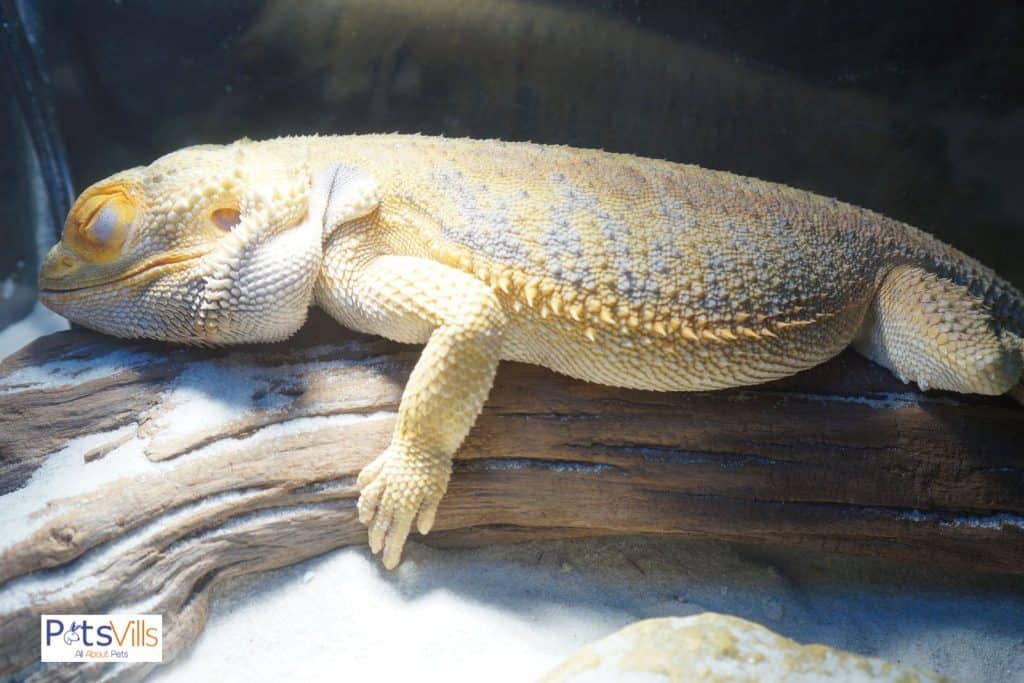
Brumation is the most common cause of a beardie losing its appetite. After all, it’s considered a natural period of a reptile’s life where they spend a long time sleeping.
These periods are a defense mechanism to prepare for “when colder seasons are approaching” (3). It’s similar to what bears do when they hibernate.
But it’s vital to know that some dragons won’t brumate in captivity. So many owners don’t need to be overly concerned about bearded dragon brumation.
You only need to recognize the signs, such as hiding, no bowel movements, and not moving. From there, please help them by ensuring they’ve got fresh water.
The brumation period usually finishes between a few weeks or four months. My dragon’s last one lasted about a month.
Here’s an adorable video of a dragon finally emerging from its brumation period.
3. Suffered an Injury or Illness
Injuries are obvious culprits for causing a dragon to stop eating. If they’ve hurt themselves or developed a condition like metabolic bone disease, it’s a common symptom (4).
So if your dragon is moving gingerly and not eating, an injury has probably occurred. I certainly understand, considering I don’t like doing anything when I’m hurting.
Meanwhile, there are also several illnesses capable of causing this issue. Some examples include internal parasites, URIs, and various tooth-related conditions.
4. Stressed Out
Stress can have a severe impact on beardies in various ways. But one of the most concerning is its ability to cause a loss of appetite.
If it’s stress, it can present itself with signs like unusual behavior and a black beard. For example, my beardie began banging his head against the tank’s wall while fighting stress.
It seemed he didn’t like my dog peering into his enclosure. Of course, I can’t blame him, as my Pitbull is massive.
Regardless, owners must figure out what’s causing their beardie stress and remove it. Some other stress-inducing elements include another beardie, new toys, and mirrors.
5. Improper Tank Environment
Domestic dragons require a particular tank environment to thrive in captivity. If their owners don’t meet these needs, it can lead to them not eating.
It’s why I often suggest checking the enclosure’s temperature whenever it does happen. After all, beardies struggle to digest their food in colder climates.
So you’ll want to get the temperature back into the acceptable range, around 85F. They also will require a basking spot that reaches anywhere from 95F to 105F.
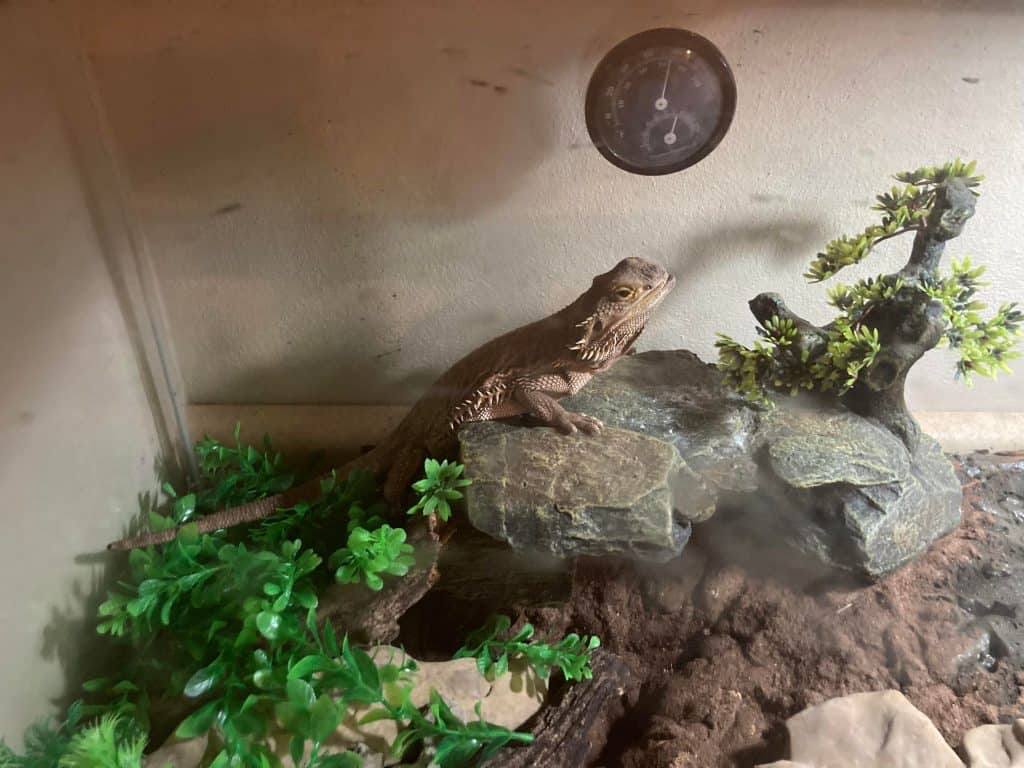
How to Deal With a Bearded Dragon Who’s Not Eating?
If your beardie isn’t eating, the first move is to call the vet. It’s always better to get an expert’s opinion than to take an educated guess.
They’ll help you decide if it’s fixable without a visit. If it’s something more serious, you can schedule a visit to figure out what’s causing the issue.
In the meantime, keep trying to give them food and provide constant fresh water. It’ll help them stay on schedule to reduce stress from becoming an issue.
FAQs
Can bearded dragons skip a day of eating?
Adult bearded dragons can skip a day of eating without many consequences. But it’s vital to ensure they have clean, fresh water to help them through it.
How long can a bearded dragon go without water?
Bearded dragons can go about a week or two without drinking water. But owners should provide them with it daily and refrain from testing this ability.
Conclusion
How long can a bearded dragon go without food? About two months, though, it’s not an ability you should test as they need feeding daily to thrive.
But if your dragon’s not eating by choice, finding the cause behind it is vital. The causes ranging from very serious to not concerning at all.
So you need to figure out where your dragon’s lack of eating lands. Remember, calling a vet for a consultation is always a good idea.
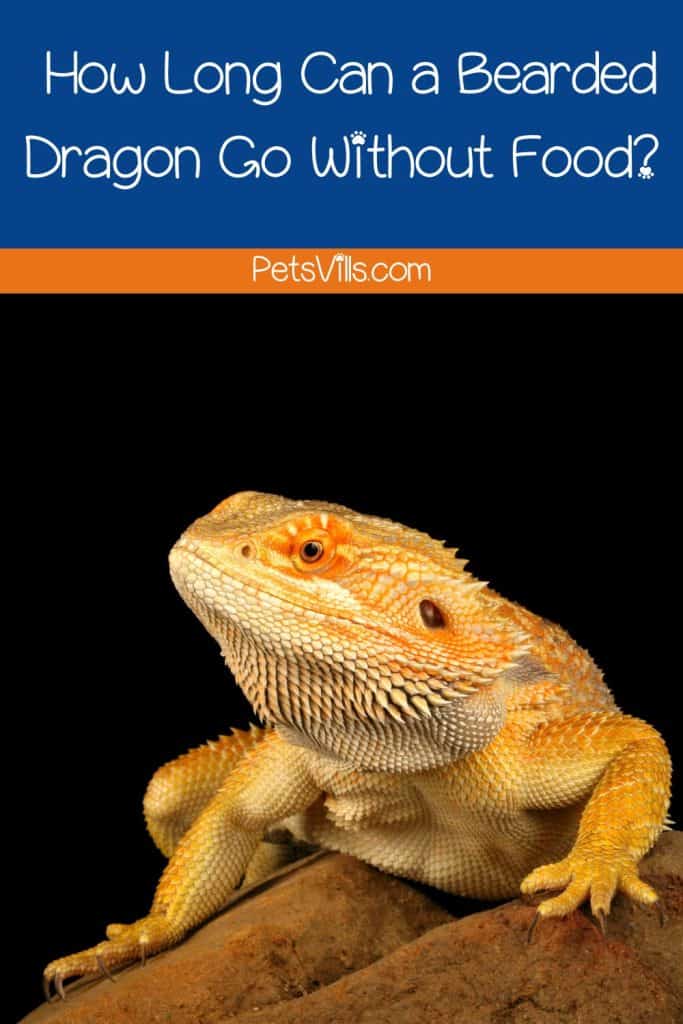
So, how long does your bearded dragon survive without food? Let us know in the comments section!
Resources
- 1. Schabacker S. Bearded Dragons [Internet]. National Geographic. 2019. Available from: https://www.nationalgeographic.com/animals/reptiles/facts/bearded-dragon
- 2. bearded-dragons-feeding | VCA Animal Hospital [Internet]. Vca. [cited 2022 Oct 6]. Available from: https://vcahospitals.com/know-your-pet/bearded-dragons-feeding#:~:text=Bearded%20dragons%20come%20from%20a
- 3. brumation | zoology | Britannica [Internet]. www.britannica.com. Available from: https://www.britannica.com/science/brumation
- 4. BBC Two – Trust Me, I’m a Vet, Series 1, Episode 1 – How to prevent metabolic bone disease in bearded dragons [Internet]. BBC. Available from: https://www.bbc.co.uk/programmes/articles/N9CkM0GVW83bWlFMQcjlnD/how-to-prevent-metabolic-bone-disease-in-bearded-dragons

My name is Ben Roberts, and I absolutely love animals. So, naturally, I love writing about them too! As far as my animals, I have a Pit-bull, a Beagle-lab mix, a Chihuahua, and one old cat. Each one of them provides me with a new adventure every day. And the best part is they’re all best friends. Well, except the cat when he gets a little annoyed.
FIND HIM ON: FACEBOOK and TWITTER.
Read his latest ARTICLES
Learn more about Benhere

